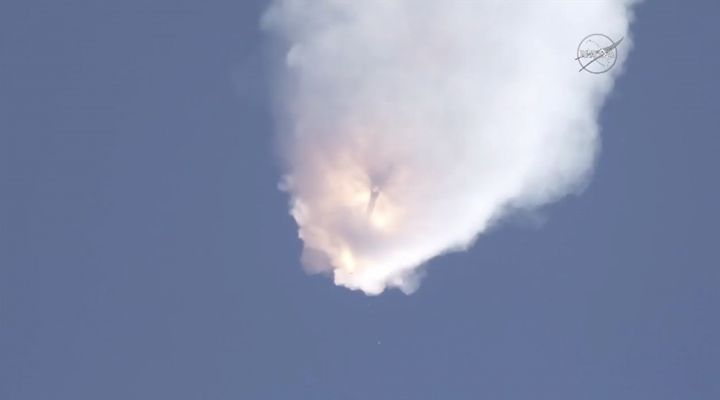
There's nothing routine about space exploration, even if Elon Musk is involved in it. He's an entrepreneur known for literally pushing the frontier, whether it's offering rockets for military launches, trying to land rockets on a drone or being so bold as to think a private company can supply the International Space Station.
But space is full of setbacks due to the high cost and the technology being flown to the edge of what is possible, and that was shown in spades on Sunday (June 28). A few minutes after launch, a SpaceX Dragon spacecraft on its way to the space station exploded. The cause is under investigation. And it actually represents the third failure of a station resupply ship in just eight months.
"Falcon 9 experienced a problem shortly before first stage shutdown," Musk wrote on Twitter on Sunday, adding, "There was an overpressure event in the upper stage liquid oxygen tank. Data suggests counterintuitive cause." An investigation is ongoing and the cause is still exactly unknown.
SpaceX is a new rocket company among the many in the world that provide space services to low Earth orbit and far beyond. It has come very far, with headlines being made whenever Musk tries something daring. But with this latest failure, some critics worry that SpaceX is not ready yet to carry military launches.
The Washington Post points out the current supplier (United Launch Alliance, a joint venture of Boeing and Lockheed Martin) has a 100% success rate across 83 launches, and has two rockets to choose from. Congress is now taking steps to restrict the use of Russian-made rocket engines due to international relations problems last year. The Post says ULA will run out of rocket engines shortly for one of its rockets (the Atlas V) and is planning to cease producing most of the alternative rocket, the more expensive Delta IV.
"Therein lies the risk," writes William Shelton, the former commander of Air Force Space Command. "Once United Launch Alliance runs out of RD-180 engines and Delta IV production stops, the only available rocket for most payloads will be SpaceX’s uncertified Falcon 9 Full Thrust. The long-standing national space policy to ensure two means of access to space for national security satellites will be ended, essentially by congressional fiat."
The other supply failures lately were a Progress spacecraft from Russia (which could not be controlled once it reached orbit) and an Orbital Sciences Cygnus spacecraft (which exploded upon launch last year). In a statement, NASA administrator Charles Bolden said that the agency is prepared to deal with the loss of commercial spacecraft from time to time. "The astronauts are safe aboard the station and have sufficient supplies for the next several months," he added.
But space is, and likely will remain, an inherently risky business. Dozens of astronauts and cosmonauts have died in various types of spacecraft, the latest being the Columbia space shuttle breakup during re-entry in 2003. Spacecraft can and do fail, as anyone looking at the troubled history of Mars missions alone will understand. While reliability advances are happening all the time, space is inherently hard.
Do you have a way to make it a bit safer? Create a HeroX challenge and let us know how this could happen.
Top image: SpaceX's rocket exploded June 28, 2015. Credit: NASA Television








